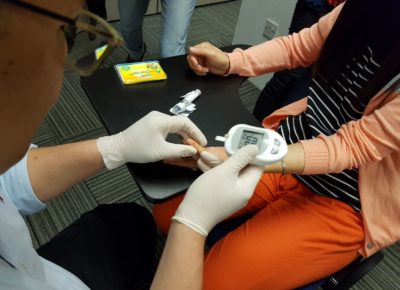Nursing Degree Types: 10 Fast-Growing Fields
The practice of nursing degree is a crucial component of the health care system. This includes caring for physically, mentally ill, and disabled individuals of all ages in various community settings promoting health, and preventing illness.
However, there are numerous different types of nurses that you might be because the nursing profession is continuously changing. Additionally, the need for nurses is constantly increasing, and a career in nursing offers many worthwhile advantages, like good pay, lots of chances, and a sense of purpose.
In this post, you’ll discover the various types of nurses and the exceptional opportunities for each nursing position.
10 Nursing Careers with Rapid Growth

Given the wide range of nursing specialties, it might be challenging to determine what kind of nurses would suit you. Moreover, there is a type of nurse for every interest, from a nurse practitioner to an oncology nurse.
The 10 nursing specializations with the quickest growth rate are described here, along with a list of various nurses.
1. Registered Nurse (RN)

Even though there are many other kinds of nurses, registered nurses (RNs) are frequently regarded as the foundation of the nursing system.
Registered Nurses coordinate and deliver patient care. Additionally, they educate patients and the general public about ailments, diseases, and other factors that affect health. Licensed healthcare professionals collaborate with patients, physicians, and other healthcare personnel.
Moreover, RNs can give patients a high level of direct care, whereas other nurses, such as licensed practical nurses, are more concerned with supporting RNs or doctors. In addition, RNs are essential in coordinating healthcare and ensuring that everything runs smoothly in patient care.
- Education Requirement: Associates Degree or Bachelor of Science Degree
- Expected Job Growth: 15% increase
- Employment Locations: Hospitals, residential care facilities, nursing care facilities, etc.
- Relevant Certifications: State Nursing License
- Salary Range: $60,300 – $75,900
Suitable for you if: You want to start working only after two to four years of schooling and desire a medical career that allows you to work with a healthcare team to care for patients.
2. Cardiac Nurse
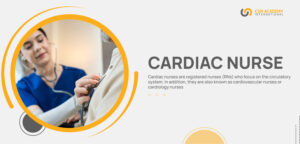
Cardiac nurses are registered nurses (RNs) who focus on the circulatory system. In addition, they are also known as cardiovascular nurses or cardiology nurses. They assist patients with cardiac issues by adhering to the prescribed treatment plan, keeping track of their progress, and giving medication to enhance recovery.
However, depending on the workplace, a cardiac nurse’s daily duties may change. For example, cardiac nurses in acute care settings might spend a lot of time using defibrillators to treat patients experiencing cardiac arrest. Moreover, in a surgical context, cardiac nurses are more likely to spend time preparing patients for surgery and aiding their recovery.
- Education requirements: Associates Degree or Bachelor of Science Degree, Registered Nursing License (RN)
- Job Growth Predicted: 16% Increase.
- Work Locations: Hospitals, In-Home Care, and Rehabilitation Facilities
- Credentials That May Be Relevant: State Nursing License
- Salary: $67,490 is the median yearly pay.
Suitable for you if: You are passionate about heart-related topics and want to help with various operations or patient care programs.
3. Certified Registered Nurse Anesthetist (CRNA)
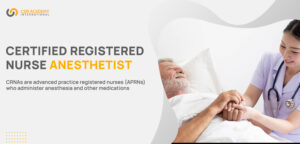
CRNAs are advanced practice registered nurses (APRNs) who administer anesthesia and other medications. Therefore, they keep an eye on patients receiving anesthesia and later recovering from it.
In addition, CRNAs have attained a doctorate with a concentration in anesthesia and substantial clinical training. They have passed a certification test approved by the National Boards of Certification and Recertification of Nurse Anesthetists (NBCRNA).
Furthermore, a medical practice called anesthesia prevents you from feeling pain while undergoing procedures or surgery. Different anesthetic types function in various ways. Therefore some anesthetic drugs numb specific areas of your body, while others affect your brain to make you fall asleep.
- Requirements for Education: Masters’s Degree (MSN), RN License, and One Year in an Acute Care Setting
- Job Growth Predicted: 16% Increase
- Workplaces: Surgical Centers, Hospitals, and Specialty Doctor’s Offices
- Relevant certifications: CRNA Certification
- Salary: $153,780 on average a year
Suitable for you if: You’re passionate about helping patients manage their pain before, during, and after procedures or medical treatments.
4. Clinical Nurse Specialist (CNS)

A clinical nurse specialist (CNS) is an advanced practice registered nurse who has earned a master’s or doctoral degree in nursing. In addition, clinical nurse specialists actively enhance healthcare delivery systems, function as knowledgeable consultants for nursing staff, and direct patient care.
Moreover, clinical nurse specialists frequently hold management positions and may also create policies and procedures independently or as part of a team. Therefore, a CNS’s primary role is to provide quality, cost-effective specialty care.
- Education Requirement: Master’s Degree and often a Doctoral degree
- Job Growth Predicted: 15% (much faster than average)
- Employment Locations: Hospitals, Physician’s Offices, In-Home Health Care services, etc.
- Certifications pertinent: N/A
- Salary range: $85,000 on average per year
Suitable for you if: You’re interested in taking on a leadership position in the nursing industry and managing a team of nurses while maintaining your medical practice.
5. Critical Care Nurse (CCN)
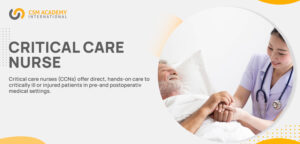
Critical care nurses (CCNs) offer direct, hands-on care to critically ill or injured patients in pre-and postoperative medical settings. Therefore, they are responsible for analyzing the advantages and disadvantages of suggested medical measures, providing life-saving care in an emergency, and nursing patients back to health.
Nurses working in a critical care environment must have advanced nursing skills. Additionally, an in-depth understanding of the specialized electronic equipment needed to monitor and treat critically ill patients.
- Education Requirement: Associates Degree or Bachelor’s of Science Degree, Registered Nursing License (RN)
- Expected Job Growth: 19% increase
- Employment Locations: Hospitals and Doctor’s Offices
- Relevant Certifications: Certification in Advanced Cardiac Life Support
- Salary Range: $71,500 median annually
Suitable for you if: You want to help people who have experienced severe trauma, including a terrible injury or a life-threatening illness.
6. Emergency Room Nurse (ERN)
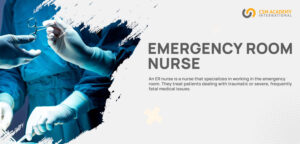
An ER nurse is a nurse that specializes in working in the emergency room. They treat patients dealing with traumatic or severe, frequently fatal medical issues.
Furthermore, the primary duties of an emergency room nurse are to recognize medical problems, assess their seriousness, and offer prompt assistance to prevent severe long-term repercussions and, in some instances, even to maintain life. Hence, when a patient is brought into the emergency room, an ER nurse is one of the initial responders.
Moreover, ER nurses need to be able to assess a severe scenario and decide how to proceed immediately. In addition, to guarantee that the severely harmed patients receive care first, they could also be tasked with handling assessment.
- Education Requirement: Associates Degree or Bachelor’s of Science Degree, Registered Nursing License (RN)
- Expected Job Growth: 16% increase
- Employment Locations: Hospitals
- Relevant Certifications: Certified Emergency Nurse (CEN)
- Salary Range: $62,000 median annually
Suitable for you if: You want to help individuals in high-pressure situations with various injuries or illnesses.
7. Family Nurse Practitioner (FNP)
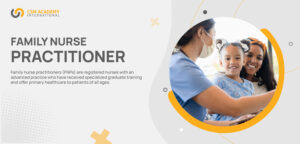
Family nurse practitioners (FNPs) are registered nurses with advanced practice who have received specialized graduate training and offer primary healthcare to patients of all ages
Therefore, FNP’s area of practice includes disease management, treatment, health promotion, and diagnosis. Besides this, FNPs can care for patients of all ages and work in various medical disciplines and environments.
In addition, FNPs carry out physical examinations, conduct diagnostic tests and procedures, and diagnose and treat illnesses. Furthermore to prescribe necessary medications, and instruct their patients on how to live healthy lives to promote health and avoid disease.
- Education Requirement: Master’s Degree in Nursing (MSN) and Registered Nursing License (RN)
- Expected Job Growth: 16% increase
- Employment Locations: Doctor’s Offices and Hospice Facilities
- Relevant Certifications: 500 faculty-supervised clinical hours
- Salary Range: $100,500 median annually
Suitable for you if: You want to give patients of all ages more thorough, all-encompassing medical treatment.
8. Geriatric Nursing
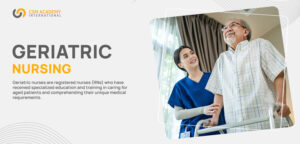
Geriatric nurses are registered nurses (RNs) who have received specialized education and training in caring for aged patients and comprehending their unique medical requirements.
Additionally, these nurses often known as “gerontology or gerontological nurses,” offer patient-centered care to a vulnerable population with the potential to significantly raise patients’ quality of life. Moreover, they are aware that ailments that might seem minor to a younger adult might swiftly turn deadly for an older adult.
- Education Requirement: Associates Degree or Bachelor of Science Degree, and Registered Nurse License (RN)
- Expected Job Growth: 18-25% increase
- Employment Locations: Hospitals, Doctor’s Offices, and Nursing Homes
- Relevant Certifications: Certification in Geriatric Nursing
- Salary Range: $66,000 median annually
Suitable for you if: You want to assist the elderly with their fundamental requirements or more complex medical, physical, or psychological disorders.
9. Perioperative Nurse (Surgical/OR Nurse)
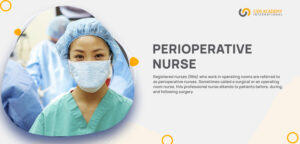
Registered nurses (RNs) who work in operating rooms are referred to as perioperative nurses. Sometimes called a surgical or an operating room nurse, this professional nurse attends to patients before, during, and following surgery.
Moreover, the perioperative nurse can work as a scrub nurse in the operating room, choosing and passing the tools and materials needed for the procedure. In addition, these nurses can also work as circulating nurses, supervising the overall nursing care in the operating room and assisting in maintaining a secure, comfortable setting.
- Education Requirement: Associates Degree or Bachelor of Science Degree, and Registered Nurse License (RN)
- Expected Job Growth: 16% increase
- Employment Locations: Hospitals, Surgical Centers and Outpatient Facilities
- Relevant Certifications: CNOR and Certified Nurse First Assistant (CNFA) Certifications
- Salary Range: $68,500 median annually
Suitable for you if: You are interested in giving women physical, emotional, or mental care before, during, or after childbirth.
10. Mental Health Nursing

Mental health nursing, often known as psychiatric nursing, is a specific area that entails providing care to people with mental health disorders to aid in their recovery and enhance their quality of life.
Furthermore, these nurses can offer specialized care because of their superior knowledge of diagnosing and treating mental diseases. In addition, a medical team often collaborates with other healthcare providers to give the patient the best possible clinical results.
- Education Requirement: Master’s Degree and Registered Nurse License (RN)
- Expected Job Growth: 31% increase
- Employment Locations: Hospitals, Rehabilitation Centers, Psychiatric Facilities
- Relevant Certifications: N/A
- Salary Range: $64,500 median annually
Suitable for you if: You are interested in developing a meaningful relationship with patients to provide them with an all-encompassing level of care that helps their emotional and mental needs.
















